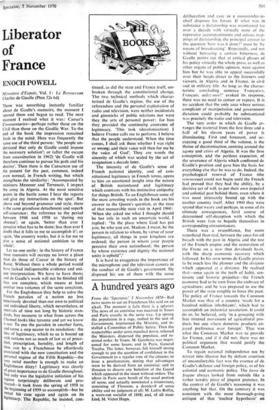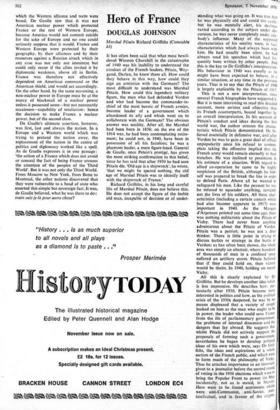Liberator of France
ENOCH POWELL
Memoires d'Espoir, Vol. 1: Le Renouveau Charles de Gaulle (Plon 52s 6d) There was something instantly familiar about de Gaulle's memoirs, the moment I opened them and began to read. The next moment I realised what it was: Caesar's Commentaries—perhaps rather those on the Civil than those on the Gaullic War. To The end of the book the impression remained fresh in the mind. Here was frequently the same use of the third person: 'the people un- derstood that only de Gaulle could impose the necessary solution'; or (after the escape from assassination in 1962) 'de Gaulle will therefore continue to pursue his path and his destiny'. Then there is the Caesarean use of the present for the past, common, indeed even normal, in French writing, but which strengthens the similarity: 'Accompanied by ministers Messmer and Terrenoir, I inspect the army in Algeria. At the most sensitive points in the battle zones I hear the reports and give my instructions on the spot'. But above and beyond grammar and style, there is the same grandiose detachment and superb self-assurance: the reference to the period between 1946 and 1958 as 'during my absence'; or again, 'better than ever I perceive what has to be done; less than ever I doubt that it falls to me to accomplish it'; or again, 'the country works, but it is for me to give a sense of national ambition to the whole'.
Let no one smile: in the history of France these memoirs will occupy no lower a place than do those of Caesar in the history of Rome. Without them a whole period would have lacked indispensable evidence and uni- que interpretation. We have to have them; and de Gaulle's work will not be finished till they are complete, which means at least another two volumes of the same concision.
For the Englishman they help to solve the French paradox of a nation no less tenaciously devoted than our own to political and individual liberty, which nevertheless, at intervals of time not long by historic stan- dards, has recourse to what from across the Channel looks like tyranny and yet we know IS not. To put the paradox in another form, and come a step nearer to its resolution: the idea of legitimacy, which to us is bound up With notions not so much of law as of prece- dent, prescription, heredity, and length of time, can by a Frenchman be effortlessly associated with the new constitution and the Personal regime of the Fifth Republic—the very serial number is enough to make an Englishman dizzy! Legitimacy was clearly of great importance to de Gaulle throughout. Not only was the legislative initiation of his regime surprisingly deliberate and pro- traeted—it took from the spring of 1958 to the beginning of 1959 to accomplish—but he _rested his case again and again on its legitimacy. The Republic, he insisted, con-1
tinued, as did the state and France itself, un- broken through the constitutional change. The two technical methods which charac- terised de Gaulle's regime, the use of the referendum and the personal exploitation of radio and television, were neither incidentals and gimmicks of public relations nor were they the arts of personal power: for him they provided the continuing assurance of legitimacy. 'This task (decolonisation) I believe France calls me to perform. I believe that the people understand. When the time comes, I shall ask them whether I was right or wrong; and their voice will then for me be the voice of God'. They are words the sincerity of which was sealed by the act of resignation a decade later.
The intensity of de Gaulle's sense of French national identity, and of con- stitutional legitimacy in French terms, opens to him an emotional insight into the nature of British nationhood and legitimacy which contrasts with his instinctive antipathy for things British. To an Englishman some of the most arresting words in the book are his answer to the Queen's question, at the time of that memorable state visit in April 1960: 'When she asked me what I thought should be her role in such an uncertain world, I replied : "In the place where God has put you, be who you are, Madam. I mean, be the person in relation to whom, by virtue of your legitimacy, all things in your kingdom are ordered; the person in whom your people perceive their own nationhood; the person by whose existence and dignity the national unity is upheld".'
It is bard to exaggerate the importance of the microphone and the television camera in the conduct of de Gaulle's government. He disposed his use of them with the same
deliberation and care as a commander-in- chief disposes his forces. If what was in substance a dictatorship was maintained for over a decade with virtually none of the repressive accompaniments and odious trap- pings of dictatorship, the principal answer to the question 'how was it done?' must be 'by means of broadcasting'. Repeatedly, and not without betraying a certain bitterness, de Gaulle points out that at critical phases of his policy virtually the whole press, as well as other organs of public opinion, were against him but he was able to appeal successfully over their heads direct to the listeners and viewers, in Algeria and in France, in civil and in military life. As long as the charac- teristic concluding sentence 'Fran raises, Francais, aidez-moil' evoked its response, there was no need to censor or repress. It is no accident that the only area where serious complaint of manipulation and government dictation could probably be substantiated was precisely the radio and television.
The very order in which de Gaulle ar- ranges the material from the first three and a half of his eleven years of power is illuminating. First and foremost, and oc- cupying a good third of the volume, is the theme of decolonisation, centring around the agony and crisis of Algeria. It was the firm conception, and the perilous execution, of the severance of Algeria which confirmed de Gaulle's position and gave him the basis for everything else that he was to do. Indeed, the psychological renewal of France (the renouveau) could not begin until the French had proved that they had the ability, by a decisive act of will, to put their own imperial and colonial past behind them, even where it was most intimately bound up with the mother country itself. After 1960 they were spared that weary and perhaps, in some of its ultimate consequences, fatal course of determined self-deception with which the British were fain to beguile themselves in corresponding circumstances. , There was a resemblance, but more superficial than real, between the once-for-all breach with the past in Algeria and the rest of the French empire and the restoration of the Franc on a new (but devalued) basis, with the sharp economic recovery which followed. In his own terms de Gaulle proves to be much less the planner and the dirigiste which appeared at a distance. He realised that—once again in the teeth of habit, sen- timent and historic prejudice—the French economy had to be torn from the embrace of agriculture; and he was prepared to use the power of the state roughly to force the pace. The policy of France towards the Common Market was that of a country 'made for a hundred million inhabitants', which had to accomplish an industrial revolution. It could do so, he believed, only 'in a grouping with free internal movement of agricultural pro- ducts but one where domestic products en- joyed preference over foreign'. That was what the Common Market was to provide for France, and if it did not, there was no political argument that would justify the Common Market.
To regain national independence not by retreat into illusion but by defiant assertion of uncomfortable fact was the essence of de Gaulle's defence and foreign policy, as of his colonial and economic policy. The force de frappe always looked from outside like a rather tawdry piece of jingoist pretence. In the context of de Gaulle's reasoning it was anything but that. On the contrary it was consistent with the most thorough-going critique of that 'nuclear hypothesis' on which the Western alliance and NATO were based. De Gaulle saw that it was not American nuclear power which protected France or the rest of Western Europe, because America would not commit suicide for the sake of Europe and no one could seriously suppose that it would. France and Western Europe were protected by their geography, by their alliances and by their resources against a Russian attack which in any case was not only not imminent but could only occur if the allies invited it by diplomatic weakness, above all in Berlin. France was therefore not effectively dependent on American command or the American shield, and would act accordingly. On the other hand, by the same reasoning, a non-nuclear power in Europe must be at the mercy of blackmail of a nuclear power unless it possessed some—but not necessarily maximum—capability of retaliation : hence the decision to make France a nuclear power, but of the second class.
De Gaulle's ultimate assertion, however, was first, last and always the nation. In a Europe and a Western world which was trying to pretend the nation away, the replacement of the nation in the centre of politics and diplomacy worked like a spell. As de Gaulle expresses it in one passage: 'the action of a France which does not avoid or conceal the fact of being France arouses the attention of the peoples of the Third World'. But it was not only the Third World. From Moscow to New York, from Bonn to Montreal, the other nations discovered that they were vulnerable to a head of state who asserted this simple but sovereign fact. It was, de Gaulle believed, what he was there to do: main suis-je la pour autre chose?























































 Previous page
Previous page